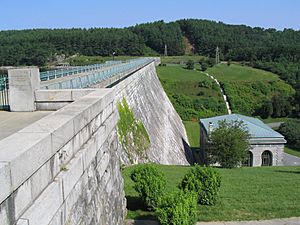Wachusett Dam facts for kids
Quick facts for kids Wachusett Dam |
|
|---|---|

Wachusett Dam at Clinton
|
|
| Official name | Wachusett Reservoir Dam |
| Location | Clinton, Massachusetts, USA |
| Coordinates | 42°24′13″N 71°41′16″W / 42.40361°N 71.68778°W |
| Construction began | 1897 |
| Opening date | 1905 |
| Operator(s) | MWRA |
| Dam and spillways | |
| Impounds | Nashua River |
| Height | 205 ft |
| Length | 965 ft |
| Reservoir | |
| Creates | Wachusett Reservoir |
|
Wachusett Dam Historic District
|
|
| Lua error in Module:Location_map at line 420: attempt to index field 'wikibase' (a nil value). | |
| Location | Clinton, Massachusetts |
| Architect | Shepley, Rutan and Coolidge; Olmsted Brothers |
| MPS | Water Supply System of Metropolitan Boston MPS |
| NRHP reference No. | 89002269 |
| Added to NRHP | January 18, 1990 |
The Wachusett Dam is a huge wall built in Clinton, Massachusetts, to hold back the Nashua River. This creates a large lake called the Wachusett Reservoir. Building the dam started in 1897 and finished in 1905. It's an important part of the Nashua River area where water collects.
The dam helps supply drinking water to the greater Boston area. The Massachusetts Water Resources Authority (MWRA) manages it. When it was finished in 1905, the Wachusett Reservoir was the biggest public water supply lake in the world. The Wachusett Dam itself was also the largest gravity dam globally at that time. A gravity dam uses its own weight to hold back water.
Building the Wachusett Dam
The Metropolitan Water Board needed a new water source for Boston. They chose the south part of the Nashua River in Clinton. This site was picked over other places like Lake Winnipesaukee in New Hampshire.
Building the dam was a massive project. Many things in the valley had to be moved or taken down. This included churches, factories, homes, and schools. Roads and train tracks also had to be relocated. A special railroad tunnel and bridge were built for the Central Massachusetts Railroad.
Even more, over four thousand bodies from the local Catholic cemetery had to be carefully dug up and moved. This huge project brought thousands of new workers to the area. Many of these workers were immigrants. The dam created the world's largest water supply reservoir at the time. It is still known as the largest "hand-dug" dam in the world today.
Early Challenges
During the first time the reservoir was filled, a problem happened on April 11, 1907. Part of the dam's side, called the North Dike, became unstable. The fine sand in that part of the dike turned into a liquid and flowed about 100 meters into the reservoir. Engineers worked to fix this issue and make the dam safe.
Images for kids
 | Tommie Smith |
 | Simone Manuel |
 | Shani Davis |
 | Simone Biles |
 | Alice Coachman |







